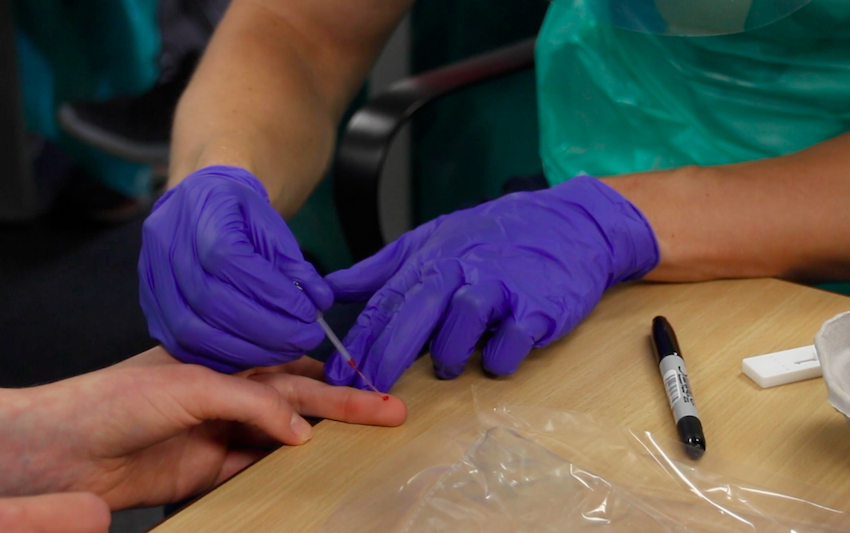


Around 4,500 islanders are now believed to have been infected with covid-19, according to a new report showing the majority experienced no symptoms, and higher prevalence among finance and government workers.
The finding came in a report on the second round of community antibody testing published by Statistics Jersey this morning.
It suggested that as many as three in five islanders (62%) didn’t exhibit signs of the virus when they contracted it.
The overall figure – which is believed to show the picture in Jersey on 20 May - is 1,200 higher than the estimate resulting from the first round of community antibody testing published one month ago.
Video: The antibody tests come in the form of a pinprick blood test, with results turned around in under an hour.
However, it is believed this may be linked to a change in the antibody test kit being used.
Of the 4,500, around 3,600 are expected to have occurred in households living in private accommodation. This equates to around 4.2% of the population.
The new report reflects a wider range of demographic factors, including prevalence across different industries, types of accommodation and geographic living area.
It showed prevalence rates were highest among public sector workers (6.4%) and finance workers (5.8%), compared to those working in construction (3.3%), hospitality (1.0%) and private education or health (1.3%).

Pictured: The report included more demographic information than previously.
Numbers of infected islanders also appeared to be higher among those living in social housing (8.6%) and non-qualified accommodation (6.3%).
There were slightly higher numbers of people with antibodies living in semi-urban (4.6%) and rural areas (4.5%) than urban zones (3.6%).
However, the study did not classify any of these differences across demographics “statistically significant”.
As part of the research, participants were asked if they had any history of symptoms.
The prevalence rate among those reporting loss of taste and smell was 47.1% - far higher than any of the other associated symptoms.
According to Statistics Jersey, the findings are broadly in line with modelling being used by the government to determine its approach to dealing with the spread of the virus locally and easing lockdown.
It also noted that Jersey’s findings were in line with other countries.
“Whilst there exists a degree of uncertainty around these figures, the results of this analysis, and the above prevalence rate, are in line with the ongoing epidemic modelling currently being conducted,” the report read.
“Additional analysis is provided by demographic breakdowns, as well as details on prevalence rates that correspond to reported symptoms. Of particular note is that this study does provide evidence that a high proportion of asymptomatic cases have taken place in Jersey. Indeed 62% of those who tested positive for SARS-CoV-2 related antibodies, reported no history of any symptoms. This behaviour is consistent with other emerging research on SARS-CoV-2 from other jurisdictions.”
A total of 1,062 islanders took part in the second round of testing.
The report emphasises that, of those that tested positive for antibodies, there is “currently no evidence” that suggests they will have immunity.
While Healgen kits, whose accuracy had been questioned, were initially, DNA World/CTK Biotech tests were used in the second round of testing.
Five participants who tested positive in the first round of testing later tested negative, which the report says is “potentially explained by the change in testing device.”
Commenting on the accuracy of the tests, the report notes: "The test devices themselves have been subject to testing, both internationally and locally by the Microbiology Department of the General Hospital. It is acknowledged that these devices have limitations and in particular have a comparatively low level of sensitivity when compared to some other diagnostic devices. This sensitivity issue can, however, be compensated for in respect of the broad population monitoring that this study is aiming to achieve."
Following the test results' publication this morning, Health Minister Deputy Richard Renouf commented: "I’d like to thank the Islanders who responded to the call for testing.
"The results of this expanded round of testing have given us much more information about how covid-19 has spread in Jersey, and how it has impacted on Islanders.”
Results were obtained from 629 households and 1,062 individuals.
602 people took part in rounds one and two, with the drop-out rate 29% between rounds.
They survey targeted 1,000 private addresses randomly selected from the Jersey Land and Property Register (JLPR).
700 of the addresses were the same as round one, which had seen “a significant level of non-response” among people living in non-qualified accommodation.
An additional 300 invites were selected for inclusion in round two from “targeted urban and sub-urban areas”.
Islanders under the age of 16 were not able to take part. The sample also excluded communal establishments like care homes, commercial properties and a small number of other non-residential properties.
Letters were sent to the addresses. Some households were also contacted by telephone, while a small team of fieldworkers visited addresses when contact wasn’t able to be made by phone or letter.
Testing was then carried out by trained health workers at two test centres. Provisions were also made for a mobile testing team to visit islanders at 80 home addresses.
Comments
Comments on this story express the views of the commentator only, not Bailiwick Publishing. We are unable to guarantee the accuracy of any of those comments.